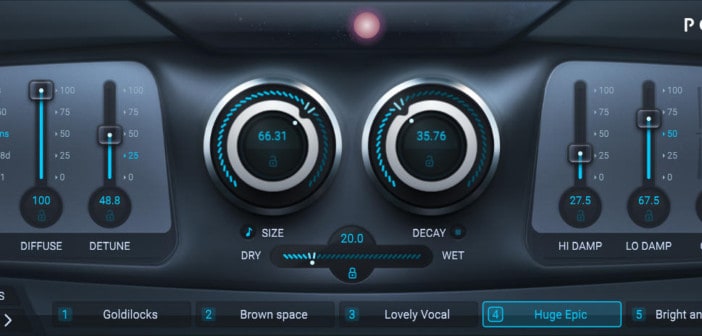I know what you’re thinking: “Do I really need another reverb plugin right now?” Yes, it’s true, we all have at least half a dozen reverbs clunking around on our system, but we only use a couple… if that. However, on occasion, we get something really special and I think Comet from Polyverse Music will inevitably shoot to the top of your list of go-to reverbs.
Acoustic reverberation behaves in a variety of ways depending on the sound source and the space around it, but regardless of its application, there’s almost always a basic understanding of real-world psychoacoustics at the heart of most reverb algorithms, and a serious effort to produce a result that’s closest to the natural phenomenon.
See also: Sound Author Releases Equinox For U-He BazillePolyverse’s Comet doesn’t disregard the physics of a natural acoustic space altogether, even though “nature” is obviously not the center of attention here. Instead, there’s a very strong focus on producing HUMONGOUS spaces that you would never encounter in the real world… I know, I know, Comet isn’t the first reverb plugin to venture off in this direction, but it’s so far out there on the fringes of enormity that I think it just might be the biggest “big verb” I’ve laid ears on.
That doesn’t mean you can’t dial in small ambiences; in fact, there’s a number of very natural sounding “Small” and “Medium” presets on hand that prove that Comet isn’t just a gargantuan atmosphere engine. But if big is your bag, you don’t have to look far, as some of the “Large”, “Eternal” and “Artsy” presets are a pitch-perfect example of how this algorithmic reverb is more than capable of a wide range of otherworldly spaces and also shimmering chorus effects!
A “Glide” parameter enables you to smoothly transition between presets, something we’ve encountered in UVI Sparkverb and Eventide Blackhole – which I reviewed four years ago here – but I personally feel that the modulation of the “Size” parameter is quite possibly the smoothest I’ve heard yet. Even in those aforementioned reverbs, sudden changes to various settings occasionally produce undesirable artifacts and that just doesn’t happen here in Polyverse Comet… EVER.
Another nifty little feature is the ability to modulate the “Size” knob with incoming MIDI note data, which can be a bit tedious when you’re routing the MIDI within your DAW, but once you’ve got it set up, it can produce all kinds of interesting results. If you’re not sure how to set this up, instructions are included in the manual for Ableton Live, Pro Tools, FL Studio, Cakewalk, Cubase and Logic X. But if you’d rather control the “Size” knob with another MIDI signal, you can simply switch off the “MIDI Control” button below the “Size” knob and assign your external MIDI controls in the “Settings” along with the added option to assign CV (Control Voltage) inputs if you happen to have external hardware in the studio.
With the “MIDI Control” button switched on, notes C-2, D-2, E-2, F-2 and G-2 will morph between the five preset slots. Speaking of which, you can also copy and paste presets from one slot to another by dragging and dropping them wherever you want them to be. However, I think it would be more ideal if “drag & drop” was more of a preset swap instead of a “copy & paste” function since I don’t really have much use for any duplicate presets… but hey, that’s just me.
You can adjust the level of the dry signal input (in addition to the dry/wet mix) and the wet signal output, which will adjust the balance of the saturation with as much as 12 dB of boost available to both signals. Obviously, you have the usual tonal controls including “Hi/Lo Damp” filters applied to the feedback path and a “Color” knob adjusting the reverb’s overall tone, which is more or less par for the course, and the same can be said for the “Diffuse” & “Predelay” controls – but the “Detune” fader applies modulation to the reverb tail in a way that I’ve not encountered before.
“Infinite” decay times aren’t actually infinite, but from my experience with most “freeze” algorithms that basically just loop a segment of audio within the buffer, most of those algorithms, unfortunately, produce unpleasant repetitive artifacts, so I’m fine with the way Comet does this, even if the so-called “infinite” feedback will eventually go silent, but only after about TWENTY MINUTES or even longer.
Regardless of flexibility, what really matters at the end of the day is how this thing sounds, and that’s what really jumps out at you. Comet’s silky, pristine reflections sparkle like no other reverb I’ve used so far. It’s “unnatural” in the best possible way, which makes it perfect for ambient sound design. You can generate beautiful atmospheres with the simplest sound, and the performance-ready controls make Comet one of the most obvious choices for atmosphiles everywhere. What’s not to love?
More info: Polyverse Music Comet ($99 on sale until July 8th, $149 regular price)


